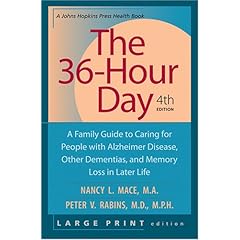
Concern about stigma and denial of symptoms can delay a diagnosis of Alzheimer's disease by more than two years (28.7 months) on average after symptoms appear, according to a new survey from the Alzheimer's Foundation of America (AFA).
Stigma and Denial Delay Diagnosis of Alzheimer's
Caregivers Face Particular Troubles
NEW YORK -- Concern about stigma and denial of symptoms can delay a diagnosis of Alzheimer's disease by more than two years (28.7 months) on average after symptoms appear, according to a new survey from the Alzheimer's Foundation of America (AFA).
When people with Alzheimer's disease are concerned about stigma, a diagnosis of Alzheimer's disease occurred on average 3.5 years (40.1 months) after symptoms appear.
When caregivers are concerned about stigma, delay of diagnosis is even more severe, averaging 6 years (71.4 months).
The survey was conducted by Harris Interactive on behalf of AFA, a national nonprofit organization providing care and services to individuals with Alzheimer's disease and related dementias, and their families.
"Any delay in diagnosis is a setback for people with Alzheimer's disease and their caregivers -- and a delay of two years or more is a serious and unnecessary setback," said Eric J. Hall, chief executive officer of the Alzheimer's Foundation of America.
"While facing Alzheimer's disease is never easy, getting a diagnosis is an essential step to managing and treating the disease. Living with this in silence can isolate people with Alzheimer's disease and their caregivers, leaving them without critical support, resources, and proper treatment. We encourage everyone touched by Alzheimer's disease to reach out for support -- help is out there."
Survey results also reveal a distinct generation gap between caregivers of parents and caregivers of spouses with Alzheimer's disease.
Caregivers of parents are significantly more likely than caregivers of spouses to say they now have less time for themselves (74 percent vs. 56 percent) and have felt abandoned by family (34 percent vs. 14 percent).
Caregivers of spouses confide in significantly fewer sources of support than caregivers of parents (2.7 vs. 3.3 on average), and are significantly less likely to say they would like more help (52 percent vs. 77 percent).
In addition, caregivers of spouses (33 percent) are significantly more likely than caregivers of parents (12 percent) to indicate that their own denial was an obstacle to diagnosis.
Many sibling relationships suffer under the stress of caring for a parent with Alzheimer's disease and the division of caregiving responsibilities.
More than half of caregivers of parents, with siblings (60 percent), report that they are the only one of their siblings responsible for their parent's care.
Many of these respondents report that relationships with siblings deteriorated after a parent was diagnosed (86 percent of siblings were somewhat or very close prior to diagnosis vs. 75 percent post-diagnosis).
Sixty-nine percent of caregivers surveyed report that they want more help from family and friends.
Caregivers indicate that more help in certain areas could ease the caregiving strain, most notably assistance with day-to-day caregiving activities (20 percent), more financial support (16 percent), more emotional support (15 percent) and more time for themselves (13 percent).
Caregivers of parents are significantly more likely than caregivers of spouses to feel comfortable talking about the condition with all of the people in their life (80 percent vs. 64 percent). Caregivers overall are most likely to confide in friends (58 percent), physicians/healthcare professionals (41 percent), children (38 percent), spouses (35 percent), and siblings (33 percent).
Lack of knowledge about the disease is a barrier to diagnosis for two in five caregivers surveyed (40 percent), suggesting that more education is needed. While the majority (92 percent) of caregivers report that they are aware of medications that may slow the progression of symptoms, only half (51 percent) of caregivers surveyed are aware of the opportunity for combination therapy.
"If you notice memory problems or any other possible warning signs, such as agitation, restlessness, disorientation, or difficulty performing regular tasks, make an appointment with your doctor," said Beth Safirstein, M.D., co- president/medical director and practicing physician at the MD Clinical/MD Clinical Trials Foundation, Inc., Hallandale Beach, FL.
"Diagnosis and treatment are essential because there are treatments available, including combination therapy, that have shown to potentially help maintain a person's ability to think clearly and perform everyday tasks for a longer period of time than if left untreated."
Remarkably, many caregivers who mentioned fear of stigma and/or denial as a reason for delay in diagnosis appear to have largely overcome their fear and are more likely than those who did not struggle with stigma and denial to say they are extremely or very knowledgeable about Alzheimer's disease (72 percent vs. 59 percent).
Moreover, the majority of caregivers surveyed report finding new, positive qualities in themselves during the process of caregiving: roughly two-thirds (64 percent) of caregivers report they have become a more compassionate person since caring for a loved one with Alzheimer's.
Additionally, 76 percent of caregivers state they have learned that they are stronger than they thought since caring for someone with the disease.

The 36-Hour Day: A Family Guide to Caring for People with Alzheimer Disease and Memory Loss in Later Life